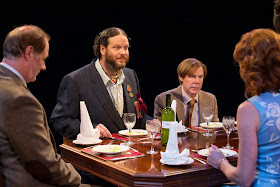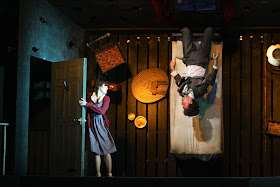Derek
Boyes, Albert Schultz, Oliver Dennis & Sarah Mennell in Table Manners
Photos by Cylla von Tiedemann
Reviewed by James Karas
Some forty years ago Alan Ayckbourn
wrote a hilarious trilogy called The Norman Conquests. It consists of
three play entitled Table Manners, Living Together and
Round and Round the Garden. Soulpepper revived the three plays last
November and it has bought them back for those who missed them. We should be
grateful for the laughter and sheer joy of seeing of seeing these very funny
plays. In case you are wondering, the title of the trilogy has nothing to do
with the invasion of England in 1066.
The three plays have the same six
people, in different parts of the same house, on the same weekend, involved in
the same plot. Yet the plays are different, self-contained and can be seen in
any order. That is a major achievement for a playwright.
Table Manners, the first part of the trilogy, takes place in the
dining room; Living Together is set
in the living room and Round and Round
the Garden, in the garden. In each play we have a family get-together of six
distinct, eccentric, dysfunctional and hilarious people. Ted Dykstra directs
the fine Soulpepper cast with inventiveness, imagination and comic brilliance.
All the action takes place in a house in the country. Reg (Derek Boyes) and his wife Sarah (Fiona Reid) arrive at the house to look after Sarah’s mother so that Annie (Laura Condlin) can get away for a weekend.
Ruth’s husband Norman (Albert Schultz) also arrives and we soon learn that he is to be Annie’s weekend companion. Annie just happens to be Ruth’s and Reg’s sister and she has already rolled on the carpet with Norman. Annie’s neighbour Tom (Oliver Dennis) completes the sextet of characters that people the three plays.
The cast ekes out every laugh
that Ayckbourn wrote and many more thanks to outstanding acting and directing. Shultz
as Norman is irresponsible, irrepressible, rude, crude, lazy, slovenly and
hilarious. He is a total slob who somehow manages to conquer his wife’s
apparently sensible and attractive sister as well as his brother-in-law Reg’s
wife Sarah. He exudes some kind of charm in the midst of countless uncharming
qualities. Schultz takes advantage of every opportunity and uses his ample
comic talent to give us a riotous protagonist.
Norman’s eccentricities are surpassed by his wife Ruth who is cold, shortsighted, nuts and nasty and done superbly by Mennell.
Annie is single, lonely, frustrated and all alone in looking after her invalid and very high maintenance mother whom we never see. She is sensible except in her relations with Norman and her neighbour Tom. She agrees to spend a weekend in a hotel with Norman against all the rules of common sense and prudence but without offending the rules for producing laughter. A fine job by Condlin.
Competing for the top spot on hilarity scale in a crowded
field is neighbour Tom, Annie’s maladjusted neighbor and would-be lover. Dennis
wears a red hairpiece and looks like the eternal misfit. Indecisive, dense,
awkward, Tom becomes hilarious in the hands of Dennis.
The plays are done in the small Michael Young Theatre with the playing area in the middle and seats on each side. This setup is not particularly suitable for plays that have numerous entrances and exits through specific doors. The usual proscenium stage works much better.
But that is a small quibble over a terrific production of
this marvelous trilogy.
The Norman Conquests (Table Manners, Living Together and Round
and Round the Garden) by Alan Ayckbourn continues until March 8, 2014 at
the Young Centre for the Performing Arts, 55 Tank House Lane, Toronto, Ontario.
www.soulpepper.ca 416 866-8666












